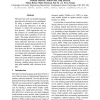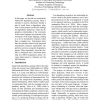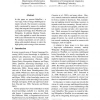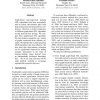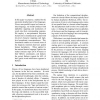ACL
2010
13 years 9 months ago
2010
Most previous work on trainable language generation has focused on two paradigms: (a) using a statistical model to rank a set of generated utterances, or (b) using statistics to i...
ACL
2010
13 years 9 months ago
2010
We investigate active learning methods for Japanese dependency parsing. We propose active learning methods of using partial dependency relations in a given sentence for parsing an...
ACL
2010
13 years 9 months ago
2010
In this paper we describe an intuitionistic method for dependency parsing, where a classifier is used to determine whether a pair of words forms a dependency edge. And we also pro...
ACL
2010
13 years 9 months ago
2010
ACL
2010
13 years 9 months ago
2010
We present a method for automatically generating focused and accurate topicspecific subjectivity lexicons from a general purpose polarity lexicon that allow users to pin-point sub...
ACL
2010
13 years 9 months ago
2010
Graph-based semi-supervised learning (SSL) algorithms have been successfully used to extract class-instance pairs from large unstructured and structured text collections. However,...
ACL
2010
13 years 9 months ago
2010
Word Sense Disambiguation remains one of the most complex problems facing computational linguists to date. In this paper we present a system that combines evidence from a monoling...
ACL
2010
13 years 9 months ago
2010
In this paper, we propose a novel approach to automatic generation of summary templates from given collections of summary articles. This kind of summary templates can be useful in...
ACL
2010
13 years 9 months ago
2010
This paper proposes new algorithms to compute the sense similarity between two units (words, phrases, rules, etc.) from parallel corpora. The sense similarity scores are computed ...
ACL
2010
13 years 9 months ago
2010
In this paper we propose a method for the automatic decipherment of lost languages. Given a non-parallel corpus in a known related language, our model produces both alphabetic map...
